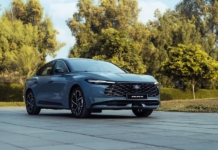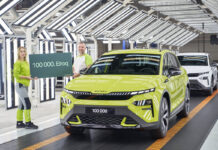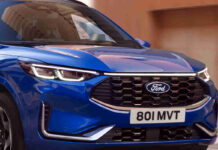GM Touts CO₂ Emissions Reduction In Brazil During COP30
İLGİ ÇEKENLER
Highest level of safety: MINI Cooper Electric wins Euro NCAP Best in Class
The fully electric MINI Cooper - which has already been awarded 5 stars in the...
Bentley Motors recognised by Top Employer for excellent workplace culture
Bentley Motors is pleased to announce it has been recognised as a UK Top Employer...
The Dacia Sandriders wins the Dakar Rally
The Dacia Sandriders has won the 48th Dakar Rally, the toughest test of car and...
New Ford Taurus Arrives in the Middle East
Ford Middle East and North Africa has marked the official arrival of the new Taurus...
CarpodGo T3 Pro (2025) Review: A Smart Wireless Infotainment Upgrade
The 2025 CarpodGo T3 Pro positions itself as a premium, portable infotainment upgrade for drivers...
Ford Mustang Mach-E GT Arrives in the UAE
Lynk & Co has officially launched in the UAE with a bold, large-scale lifestyle brand...
Lynk & Co Launches in the UAE with a Bold Lifestyle-Performance Experience
Lynk & Co has officially launched in the UAE with a bold, large-scale lifestyle brand...
Challenges and Opportunities Ahead for Batteries
By: Puneet Sinha, Senior Director, Battery Industry for Siemens Digital Industries Software
The battery industry is...
Volkswagen Commercial Vehicles saved 100,000 tonnes of CO2….
Volkswagen Commercial Vehicles saved 100,000 tonnes of CO₂ and continues drive towards sustainability at its...
Ford F-150 Lightning is Officially Dead But Will Return as Extended-Range EV
Ford confirmed on Monday the discontinuation of the F-150 Lightning, whose production had been suspended indefinitely...
Lexus LFA Concept, the future of BEV sports cars
Lexus has unveiled...
Skoda Elroq, 100,000 units produced in less than a year
Skoda Elroq has...
Renault 5 E-Tech Electric, new milestone in Douai
The Manufacture Ampere...
KIA EV2, what we know one month after its debut
In January 2026,...
Lancia returns to the world rally championship with Yohan Rossel and Nikolay Gryazin
The appointment with...
Brussels Postpones Announcement on the End of Internal Combustion Engines in 2035
The European Commission delays its crucial decision on the cut-off date for selling internal combustion...
Ford is thinking of a rear-wheel drive electric sedan
Ford's recent product...
Three for one: Sordo, Lappi and Paddon to replace Tänak at Hyundai in 2026
Shortly before the...
Illness at Super Formula debut for Kalle Rovanperä
Uphill straight away...
Alpine, two electric roadsters in the range by 2030
Alpine has announced...




























